#studying vocabulary
Text
接続詞(せつぞくし)
conjunctions - words that are used to link phrases together
情報を加える // Adding information:
しかも besides
そのうえ moreover, on top of that
さらに moreover, on top of that
そればかりか not only that, but also...
そればかりでなく not only that, but also...
情報を対比する // Putting into contrast:
それに対して in contrast
一方 whereas
他の可能性・選択肢を言う // Giving alternatives:
あるいは or perhaps (presenting another possibility)
それとも or (presenting another option within a question)
結論を出す// Drawing a conclusion:
そのため for that reason
したがって therefore
そこで for that reason (I went ahead and did...)
すると thereupon (having done that triggered sth. to happen)
このように with this (adjusting a conclusion to the arguments given beforehand)
こうして in this way
理由を言う // Giving a reason:
なぜなら...からだ the reason is
というのは...からだ the reason is
逆説を表現する // Expressing a contradiction:
だが however, yet, nevertheless (contradicting what one would have expected)
ところが even so (spilling a surprising truth)
それなのに despite this, still
それでも but still (despite a certain fact, nothing changes)
説明を補う // Amending one's explanation:
つまり that is, in other words (saying the same thing using different words)
いわば so to speak (making a comparison)
要するに to sum up, in short
説明を修正する // Revising one's explanation:
ただし however (adding an exception to the information stated beforehand)
ただ only, however
もっとも however (obviating any expectations that might arise through the previous statement)
なお in addition, note that (adding supplementary information)
話題を変える // Changing the subject:
さて well, now, then (common in business letters after the introductory sentence; is often ignored in tranlations)
ところで by the way
#文法#grammar#conjunctions#japanese grammar#jlpt n2#japanese langblr#japanese language#language#japan#japanese#japanese vocabulary#langblr#linguistics#studyblr#study blog#studyspo#study motivation#study aesthetic#study notes#learning japanese#nihongo#日本語#日本語の勉強#light academia#light acadamia aesthetic
666 notes
·
View notes
Text
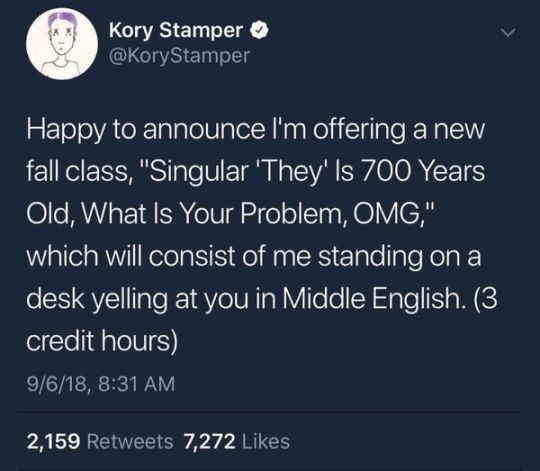
1K notes
·
View notes
Text
One-Page Masterlist
안녕하세요! Hey everyone! I recently got an ask about my old masterlist, which is the same as my broken-down masterlist except it has all of my lessons on one page, rather than on multiple separate posts. Some may find this expanded version easier to navigate, so I’ll keep this up for y’all! My broken-up masterlist, of course, will still be available for those who find that more helpful :)
Hangul Lessons
Consonants
Vowels
Writing/Reading Korean Syllables
Some 받침 Rules
Diphthongs
Stroke Order
Some More 받침 Rules
Irregular Verbs
The Basics
Common Phrases
Numbers
Sino-Korean vs. Native Korean Numbers (Instagram Post)
Sentence Structure and Particles
Present-Tense Conjugations and Formal Language
Adjectives
Questions
Honorifics and Casual Language
Beginner
Negative Sentences
잘 and 못
Past Tense
Future Tense (-ㄹ / 을 것이다)
-ㄹ / 을 까요? (Shall we…? / I wonder…?)
-(으)세요 (Giving Commands / Asking Questions)
Telling Time
-고 싶다 (I want to…)
How to Say “And”
-지만 (However)
아/어/여서 (So…)
Negative Commands
Spacing (띄어쓰기)
Adverbs
ㅂ Irregular
Comparatives and Superlatives
난, 날, & 내가
Upper-Beginner
-(으)면 (If…)
아/어/여도 (Even though…/Even if…)
(으)면 되다 / 아/어/여도 되다 (I can…/You may…)
-아/어도 되다: Asking for and Giving Permission (Instagram post)
-(으)면 되다 & -(으)면 안 되다 (Instagram post)
아/어/여야 되다 and 아/어/여야 하다(Have to / Should)
Present Progressive (-고 있다)
How to Say “Or”
-아/어/여하다
All About 중
How to Use -(으)로
Before & After
-ㄴ/은 채로
Intermediate
Describing Nouns with Verbs (-는 것)
Describing Nouns with Verbs - Past & Future Tense (-ㄴ/은 / -ㄹ/을 것)
Nominalization
것 같다 (I think… / It seems…)
-러 가다 / -러 오다
-(으)려고 (In order to…)
-기로 하다 (to Decide to do Smth)
척하다 (To Pretend)
-게 되다
-군요 / -구나
아/어/여 보다 (to try…)
-은/ㄴ 적 있다 / 없다 (I have / have not)
-ㄹ/을 게요 (Future Tense)
겠다
-ㄹ/을 수 있다/없다 (I can / cannot)
-ㄹ/을 때 (When…)
-ㄴ/는다면 (If)
-(으)면서 and -(으)며
-(으)니까 (Because / So)
-아/어/여주다
-(ㄴ/는)다 (Narrative Form)
Quoting
Let’s…
Quoting continued
(으)ㄹ래요? (Wanna…?)
-죠
-대로
More Quoting - 대 & 래
잘하다 & 못하다 vs. 잘 하다 & 못 하다
-아/어 가지고
-(으)려면
-는 길에 & -는 길이다
-(으)면 vs. -ㄴ/는다면 (Instagram Post)
-았/었을 것이다
-느라고
-는 데(에)
-ㄹ/을 뻔하다
Upper-Intermediate
-ㄴ/는데
-(으)ㄴ/는지 (Whether or not)
-(이)라는…
All About 아무리
-잖아요
Expressing Surprise
-시 (Honorific)
Making Comparisons
-아/어/여지다
I might…
So that…/To the point where…
Causative Verbs
시키다
Passive Verbs (part 1)
Passive Verbs (part 2)
-ㄴ/은가 보다 & -나 보다 (I guess…)
-ㄹ/을수록
Other Meanings of 싶다
-자마자 & -는 대로(As soon as…)
-긴 하다
-치고
-김에
차라리 (Rather)
-(으)ㅁ Nominalization
-기는 무슨 & -기는 개뿔
-고 보니까
-듯(이)
버리다
-(으)면 좋겠다 & -(으)면 하다
-길 바라다
Advanced
-거든(요)
-줄 알다/모르다
-ㄹ/을 테니까 and -ㄹ/을 텐데
-았/었던
아니라 and 대신에
-ㄹ/을 리가 없다
편이다, 별로, and More
-지 그렇다 (Why don’t you…?)
-ㄹ/을 걸
-ㄹ/을 까 보다
-다면서요
-다니 part 1
-다니 part 2
뜻이다 & 말이다
-다가
-더라고(요)
-더니
Some colloquialisms: 아니시에이팅 and 뭐 이렇게
-(으)ㅁ Sentence Ending
-다 보니까
What does 따위 mean?
-ㄴ/는데도
Korean Idioms
Vocabulary
Must-Know People
Must-Know Places
Must-Know Things
Must-Know Verbs
Must-Know Adjectives
Countries
Months, Days of the Week, and More
Clothing (옷)
School (학교)
Autumn (가을)
Autumn (w/Pictures!)
More Questions
House / Apartment (집 / 아파트)
Emotions / Feelings ( 감정)
Animals (동물)
Loan / Konglish Words
Food and Drink (먹을 것과 마실 것)
Parts of the Body (몸)
Counters
Modes of Transportation (교통 수단)
Colors (색깔)
Colors (with Pictures!)
Weather (날씨)
Winter (겨울)
Music & Instruments (음악과 악기)
Baking Gingerbread Cookies
Emergency (비상)
Hygiene & Bathroom (위생 & 화장실)
Indefinite Pronouns
Work / Office (일 / 사무실)
Spring (봄)
Coronavirus Prevention (코로나바이러스 방역)
How to Wash Your Hands (손을 씻기)
Time (시간)
Korean Cuisine (한식)
Summer (여름)
Summer (여름) w/Pictures!
Graduation (졸업)
Identity (독자성)
Korean Text Slang
Similar Words
Makeup w/Pictures! (화장품)
Family (with Pictures!)
Pronouns
How to Say “Still” and “Already” in Korean
Tastes & Textures (맛과 질감)
K-Pop Audition
K-Pop Fandom Terminology
Different Ways to Say “Change”
Flower Names
What Does 원래 Mean?
What does 오히려 Mean?
College
Hanja Lessons
최
수
악
식
급
동
부 & 불
애
출
퇴
예
음
중
학
습
연
생
대
입
인
문
감
과
원
특
만
후
무
Charts
Present, Past, and Future Tense
Question Words
잘 vs. 못 and Negative Conjugations
Future Tenses
-았/었던 vs. -던 (at end of lesson)
Particles
Some 받침 Rules
Gifving Commands
Conjunctions and -아/어/여서 vs. -(으)니까
-(으)면 vs. -다/라면 and Different Ways to Say “And”
How to Say “Or” (at end of lesson)
Telling Time (at end of lesson)
Comparatives and Superlatives
잘하다 & 못하다 vs. 잘 하다 & 못 하다 (at end of lesson)
Comparing 잘하다/못하다, 잘 하다/못 하다, & 수 있다/수 없다
Irregular Verbs
Pop Quizzes
Level 1
K-Pop Breakdowns
TXT - “Cat & Dog”
Twice - “Feel Special”
Enhypen - “Fever”
2NE1 - “Go Away”
Lee Hi - “Only”
“기억을 걷는 시간 (Time Spent Walking Through Memories)”
KCM - “An Old Love Story (흑백사진)”
Taeyeon - “Can’t Control Myself”
Epik High - “Lost One”
Colde - “A Song Nobody Knows”
IU - “My Sea”
Enhypen - “Polaroid Love”
유라 (youra) - “하양 (RAL 9002)″
BTS - “Ddaeng”
Stray Kids - “For You”
Woozie - “어떤 미래 (What Kind of Future)
TXT - “Eternally”
LOONA - “Heart Attack”
Stray Kids - “Muddy Water”
LOONA - “Girl Front”
Pentagon - “Daisy”
BTS - “Sea”
Semester in SK
Nami Island (남이섬)
Things to Buy at Daiso
Shopping Phrases
Ordering Coffee
Signs in Korea
Ordering at a Restaurant
Riding the Seoul Subway
Things at the 편의점
Korean Curse Words
Etiquette in South Korea
Drinking Culture
Hanja in Real Life
Holidays in South Korea
Korean Cuisine
Concert Ticketing in South Korea
K-pop Comebacks in Korea
Summer in South Korea
What I Learned
#korean#korean language#hangul#korean grammar#korean vocab#korean vocabulary#learn korean#learning korean#langblr#Korean langblr#masterlist#apok#apopofkorean#study korean#studying korean#kpop#kpop lyrics#basic korean#beginner korean#intermediate korean#advanced korean#hanja#한국어#한글#한자#한국어 공부하기#한국어 배우기#한국어 문법#한국어 어휘#초급 한국어
2K notes
·
View notes
Text
I learned it's easier to learn verbs in their ない form first, vs. their dictionary form first. Makes recognizing the difference between Godan and Ichidan verbs 100% easier and removes the need to "remember" the "hidden/fake/lying" verbs that parade as the other verb type. The trick to doing it is far easier and I hate how Genki teaches it in the book.
Leaving me with only having to learn the conjugation patterns for Ichidan, Godan, and Irregular verbs. Far, far easier.
#learning japanese#fountain pen#jlpt#jlpt n5#kanji#japanese#日本語#senchastudying#studying#studyblr#langblr#language#fountain pen ink#見#Verbs#Japanese Verbs#Japanese Vocabulary#japanese langblr
265 notes
·
View notes
Text
French essential verbs
AVOIR = TO HAVE
ETRÊ= TO BE
MANGER = TO EAT
BOIRE = TO DRINK
MARCHER : TO WALK
VOIR = TO SEE
DORMIR =TO SLEEP
ACHETER =TO BUY
VENDRE = TO SELL
PARLER = TO TALK, TO SPEAK
DIRE = TO SAY, TO TELL
LIRE = TO READ
ALLER = TO GO
VENIR = TO COME
APPRENDRE = TO LEARN
LAVER : TO WASH
UTILISER : TO USE
COUPER : TO CUT ,TO CHOP
CUISINER =TO COOK
METTRE: TO PUT
DÉPENSER : TO SPEND
ESSAYER :TO TRY ,TO TRY ON
OUBLIER : TO FORGET
FERMER : TO CLOSE
OUVRIR: TO OPEN
VERSER = TO POUR
ÉCRIR = TO WRITE
CHERCHE : TO LOOK FOR
SAVOIR = TO KNOW, TO KNOW HOW TO DO SOMETHING
VOULOUIR : TO WANT
POUVOIR = CAN , BE ABLE TO
#langblr#language#studyblr#studying#french#language learning#french vocab#vocabulary#french language#french studyblr#learning french#french langblr
869 notes
·
View notes
Text
btw! from twitter, some context from qforever and qcellbits convo


#qsmp#miscommunicatios bc of language barrier is gonna make me insane#as people has been saying around please take whats said in english by non native speakers with a grain of salt bc they sometimes#cant express their idea fully#qforever is very CLEAR abt what is his tought process in ptbr#but he fumbles a lot in english bc he doesnt have an extensive vocabulary to articualte well#(he even asked for cellbits help in the trial thing bc cellbit knows how to do this in english#but theire still more clear in ptbr#im asking this very nicely please consult anyone whos fluent in ptbr/esp/fr if youre a native english speaker and wants more context#before trying to come up with analysis and lore and character studies as well#bc the ccs explain to their audience in their native language important points abt their view#that can be very much lost#<- qbrs defender
412 notes
·
View notes
Text



español resources
- better than duolingo lesson platform; exam style questions
- tongue twisters in spanish
- best spanish homepage (it has everything)
- spanish tutors - quite costly
- translation of 'silly phrases'
- basic spanish 1
- basic spanish 2
- basic spanish 3
- coffee break spanish (youtube)
-foreign service institute basic spanish
- foreign service institute programmatic spanish
-foreign service institute headstart for spain
- foreign service institute headstart for latin america
#elonomh#elonomhblog#student#that girl#student life#academia#chaotic academia#becoming that girl#productivity#study blog#español#españa#espanol#bilingual#multilingual#learning languages#vocabulary#language learning#target language#spanish#beginner spanish#spanish ab#international baccalaureate#ib program
78 notes
·
View notes
Text
✎ 100 common french verbs ⋆ ˚。⋆୨୧˚

être - to be
avoir - to have
faire - to do, make
dire - to say, tell
pouvoir - can, to be able to
vouloir - to want
savoir - to know
voir - to see
devoir - to have, must
venir - to come, occur
suivre - to follow
parler - to speak, talk
prendre - to take, get
croire - to believe, think
aimer - to love, like, be fond of
falloir - it is necessary, must, have to
passer - to pass, go by, cross
penser - to think
attendre - to wait for, except
trouver - to find
laisser - to leave
arriver - to arrive
donner - to give, give away
regarder - to look at, watch
appeler - to call
partir - to go, leave, go away
mettre - to put on, wear
rester - to stay, remain
arrêter - to stop
connaitre - to know, experience
demander - to ask
comprendre - to understand
sortir - to go out, take out
entendre - to hear, listen to, understand
chercher - to look for
aider - to help
essayer - to try, test
revenir - to come back, return
jouer - to play
finir - to finish, end
perdre - to lose, miss
sentir - to smell, sniff, feel
rentrer - to bring in, take in, get in, go in, come home
vivre - to live, be alive, go through
rendre - to return, give back, repay
tenir - to hold, run, keep, last
oublier - to forget, miss
travailler - to work, work on, practice
manger - to eat
entrer - to go in, enter, come in
devenir - to become
commencer - to start, begin
payer - to pay
tirer - to pull, draw
ouvrir - to open
changer - to change, exchange
excuser - to forgive, pardon, excuse
dormir - to sleep
occuper - to occupy, live in, take up
marcher - to walk, march, go
envoyer - to send, throw, dispatch, refer
apprendre - to learn, to hear
boire - to drink (alcohol)
garder - to keep, to look after, to guard
montrer - to show, point out
s’assesoir - to sit down, sit up
porter - to carry, wear
prier - to pray
servir - to serve
ecrire - to write
retrouver - to find, to meet
gagner - to win, earn
acheter - to buy
rappeler - to remind, remember, call back, be reminiscent of
lire - to read
monter - to go up, rise, come up
quitter - to leave, depart
emmener - to take (somebody), take along
toucher - to touch
continuer - to continue, go on
raconter - to tell
repondre - to answer, reply
sauver - to save
rencontrer - to meet, encounter
fermer - to close, shut
valoir - to hold, apply, be worth
compter - to count
bouger - to move
apporter - to bring, supply
decider - to decide
vendre - to sell
expliquer - to explain
agir - to act, behave, work, take effect
adorer - to adore, love
recevoir - to receive
utiliser - to use
coucher - to put to bed, lay down, to sleep
preferer - to prefer
offrir - to offer, give
preparer- to prepare, make, get ready
#french#french vocab#french language#frenchblr#french langblr#french learning#langblr#language learning#study french#foreign languages#learning french#french vocabulary#france
989 notes
·
View notes
Text
【語彙】フリマアプリ等
In the past year or so, I've sunk quite a lot of money in Japanese second hand goods. It's been quite a pleasant experience to browse through many well described offers where most of the time you get exactly what you want, in great condition and for cheap price.
Without further ado, I've compiled a list of useful vocabulary that one may encounter while shopping on Japanese online marketplaces or フリマアプリ.
General condition:
新品 - new item
中古品 - used item
未使用 - unused
未開封 - unopened, sealed
未視聴 - not played (CD, DVD)
開封済 - opened, unsealed
美品 - in mint condition
使用感 - visible signs of use
人の手に渡った - bought from someone else (ie. the person selling is not the first owner of the item)
帯付き - includes obi
特典付き - includes bonuses
Damages:
傷 or 痛み - general imperfections
汚れ - dirt, stains
染み or シミ - stain
皺 or シワ - wrinkle
擦れ or スレ - scratch
日焼け - sun discolouring
書き込み - writing, notes (in a book etc.)
Seller terms:
プロフィール必読 - please read my profile before purchase
即購入 or 即買い - immediate purchase (ie. without contacting the seller first)
値下げ交渉 - price negotiation
バラ売り - selling separately
まとめ売り - selling together
自宅保存 - stored at home
素人保存 - stored by an inexperienced person
確認済み - checked (f.ex. if the CD is playing well)
Phrases you may see in listings:
神経質な方はご遠慮ください。Please refrain from buying if you are sensitive to the item's condition.
読めればいいという方向け。Oriented at people who only care about reading the item (and don't mind the condition).
PCに取り込んで自宅保管しておりました。After ripping (the CD) it was stored at home.
暗所に保存しておりました。It was stored in a dark place.
再生に問題はありません。No problems with playing (CD, DVD).
ペット、喫煙者ございません。No pets or smokers in the household.
ご了承ください。Please accept it (the item, seller's terms etc.) as it is.
#japanese#vocabulary#polyglot#japanese studyblr#japanese language#study japanese#language studying#language study#language learning#yuria studies
348 notes
·
View notes
Text
The 然's
突然,虽然,忽然. and the other 然's can often get mixed up, so here's a quick explanation of some of the most common ones!
突然 (Túrán): This means suddenly or unexpectedly
居然 (Jūrán): This kind of means suddenly, but more in the sense of "surprisingly" or to suggest disbelief at something that happened.
忽然 (Hūrán): This also means suddenly or unexpectedly, but it has a more stronger connotation.
既然 (Jìrán): This is a conjunction meaning "since" or "now that"
既然the weather is great, let's go out!
既然 you aren't busy, let's go watch a movie.
不然 (Bùrán): This means "otherwise" or "or else";
You should study, 不然 you won't do well on the exam.
虽然 (Suīrán): This means although or even though.
虽然 I'm not good at singing, I still like to go to the karaoke.
当然 (Dāngrán): 当然 means certainly or definitely and can be used as a reply:
Can you help me with A? 当然!
自然 (Zìrán): This can mean nature or naturally.
China's 自然 is very beautiful.
She speaks Chinese 得很自然.
仍然 (Réngrán): This can mean "still" or "yet".
I仍然 haven't read that book.
依然 (Yīrán): Similar to 仍然, this also means still" or "yet" but it's usually used in more formal and literary works, whereas 仍然 is more often used in spoken language.
果然 (Guǒrán): 果然 can be used to mean "indeed" or "as expected"
This movie is 果然 interesting.
竟然 (Jìngrán): This is an adverb used to suggest surprise or something unexpected.
He竟然forgot her birthday.
显然 (Xiǎnrán): This means "clearly" or "obviously".
This soup 显然 hot.
偶然 (Ǒurán): This means "accidentally" or "by chance".
We 偶然 met at the same cafe.
How many other 然's do you know about? Drop a comment!
#slavic roots western mind#student life#student#study blog#college#college life#travel blog#aesthetic#studyblr#study motivation#chinese#china#study in china#life in china#learn chinese#chinese grammar#grammar#vocabulary#chinese vocabulary#chinese verbs#verbs#verb#chinese studyblr#mandarin langblr#mandarin#mandarin chinese#chinese language#language learning#chinese langblr#language resources
73 notes
·
View notes
Text
改まった形|Polite Forms
In formal settings like in a business meeting or at a public gathering some words are switched with politer forms. You often hear them when somebody is giving a speech, holding a presentation or on TV. But they appear in written form as well, especially in business context. Basically, everywhere where keigo is used, it is also expected to apply politer forms.
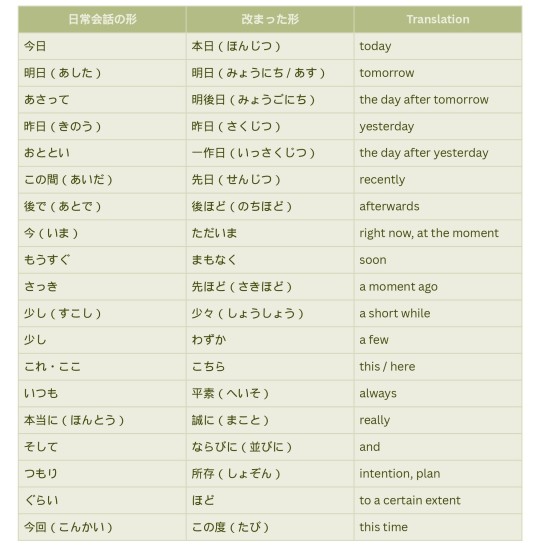
#文法#敬語#japanese langblr#langblr#studyblr#study movitation#learning japanese#japanese vocabulary#japan#japanese#study blog#study notes#language blog#keigo#japanese studyblr#japanese grammar#japanese language#日本語#日本語の勉強#nihongo
156 notes
·
View notes
Text
i have no assigments and no tests to study for. wtf? im free? 100% free? i will wake up tomorrow and think "what do i have schedule to do today?" and there will be absolute nothing? insane
#this hasnt happened in ages#i could write#work on my hobbies#which is actually a task as i made it one but lets say its a hobbie so i can enjoy it#i could clean my room?#or maybe try to make flashcards for vocabulary? like an extra to be super confident on vocab#i could just be on my phone doing nothing too#studyblr#study motivation#study#study aesthetic#study blog#studyspo#study-core-101#student#study community#studyinspo#students#student life
56 notes
·
View notes
Text
한국 전래동화에 나오는 어회와 문법 ! - Vocabulary and grammar in traditional Korean fairytales !
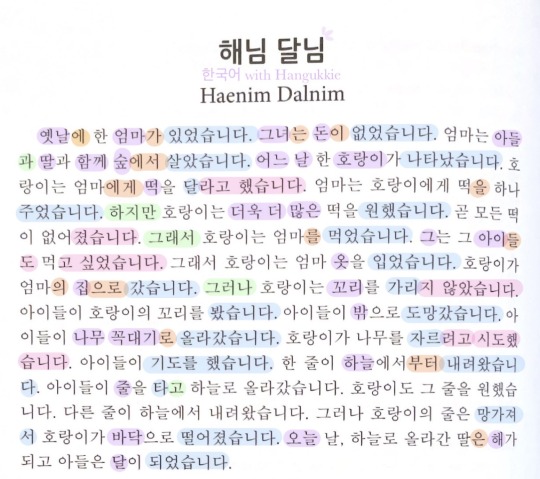
English Translation:
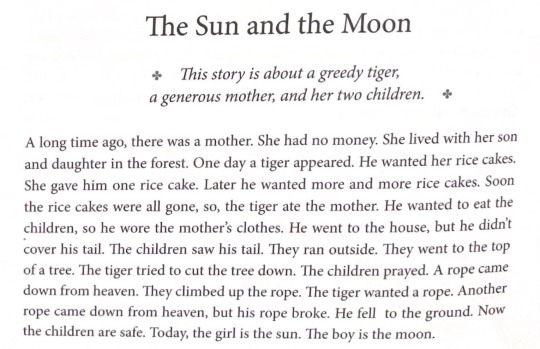
———————————————————
Vocabulary:
옛날 - Olden days
옛날에 - Once upon a time
어머니/엄마 - Mum
그녀 - She/Her
돈 - Money
아들 - Son
딸 - Daughter
함께 - Together
숲 - Forest
어느 - Which
날 - Day
호랑이 - Tiger
떡 - Rice cake
더욱 더 - More and more
많이/많은 - Many/A lot
그 - He/Him
아이 - Kid/Child
아이들 - Kids/Children
옷 - Clothes
집 - House
꼬리 - Tail
밖 - Outside
나무 - Tree
꼭대기 - The top
하늘 - Sky
줄 - Rope
바닥 - Floor
오늘 - Today
해 - Sun
달 - Moon
Grammar - Verbs:
있다 - To exist
없다 - To not exist
살다 - To live
나타나다 - To appear
달다 - To ask/To request (In this context)
주다 - To give
원하다 - To want/To wish/To desire
먹다 - To eat
가다 - To go
가리다 - To cover
보다 - To see
도망가다 - To run away
올라가다 - To go up
자르다 - To cut
기도를 하다 - To pray
내리다 - To get off
떨어지다 - To fall
된다 - To become
Grammar - Sentence Forms:
라고 하다 - For indirect quotations
지다 - To become
도 - Too/Also/As well as
고 싶다 - To want
지 않다 - Is not
려고 - To intend to
시도하다 - To attempt to
Grammar - Connectives:
과 - And/With (With 받침)
하지만 - But
그래서 - So
그러나 - But/However
하고 (고) - And/With
Grammar - Markers/Particles:
에 - To/At (Location and time marker)
가 - Subject particle
는 - Topic particle
이 - Subject particle (With 받침)
에서 - At/In/On/From (Location marker)
에게 - To/For
을 - Object particle (With 받침)
를 - Object particle
들 - Plural marker
의 - Possessive marker
으로 - By/As/For/To/Towards/With (Directional marker)
로 - By/As/For/To/With (Directional marker - with 받침)
부터 - From/Since (Location and time marker)
은 - Topic particle (With 받침)
#korean language#korean langblr#korean#langblr#korean study blog#korean studyblr#study blog#studyblr#korea#korean vocab#korean vocabulary#korean vocab list#Korean stories#Korean fairytales#Korean folktales#korean folklore#한국#한국어#한국어 공부#한국어 읽기#한국어 어휘#한국어 단어#한국어 문법#공부#읽기#어휘#단어#문법#한국 전래동화#전래동화
364 notes
·
View notes
Text
[Japanese→English] @panmaumau Tweet — Color Coded Translation

————————————————————————
何も知らない生き物の顔
なにもしらないいきもののかお
The face of a living thing that doesn’t know anything.
————————————————————————
Please correct me if I made a mistake
#color coded translation#japanese#japanese vocabulary#study japanese#japanese lesson#easy japanese#beginner Japanese#learning japanese#japanese lingblr#japanese linguistics#learn japanese#japanese langblr#japanese learning#japanese language#japanese vocab
79 notes
·
View notes
Text
Vocabulary: house (rooms)
2023년 9월 19일
안녕하세요!
Today, we will learn how to say each room of the house!
House: 집
Bathroom: 화장실
Dining Room: 식당
Bedroom: 침실
Kitchen: 부엌
Living room: 거실
Downstairs: 아래층
Upstairs: 윗층
Garage: 차고
Garden: 정원
#gigiskjourney#korean langblr#korean language#korean learning#korean study#korean vocab list#korean vocabulary#learn korean#learning korean#studyblr#south korea#korean grammar#korean#korea#korean study blog#study korean#studying korean#한국어
178 notes
·
View notes
Text
Semester in SK: Korean Curse Words
안녕하세요 여러분! I’m sharing yet another Instagram post with you all--this one is about a bunch of Korean curse words! Very silly, I know, but curse words are a big part of any language and can be fun to learn about! Of course, be careful when using these and please do not use them often--I’m just sharing them for fun and so you can recognize them if you hear them :) I hope you enjoy! 화이팅!

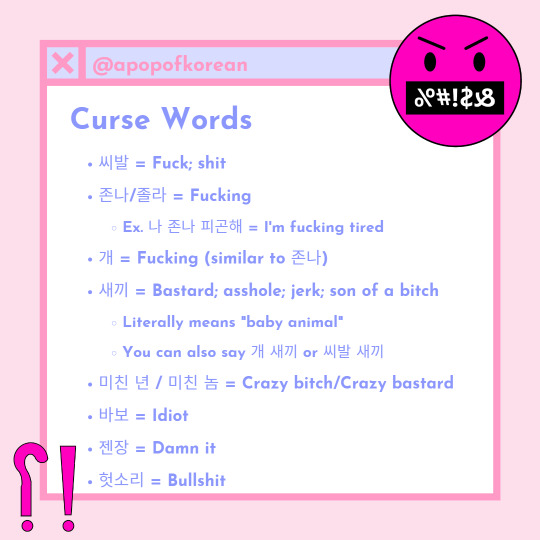
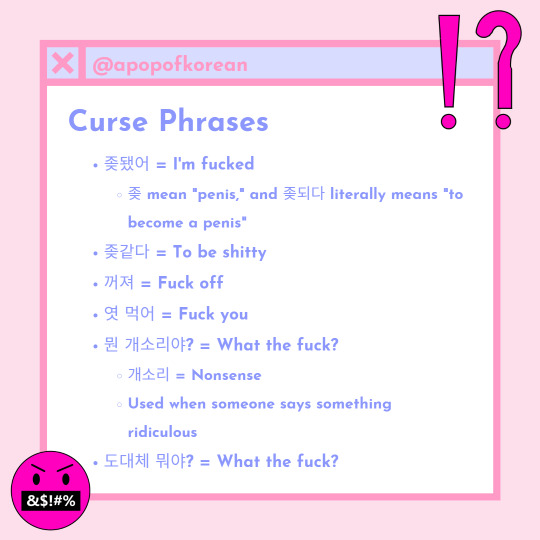
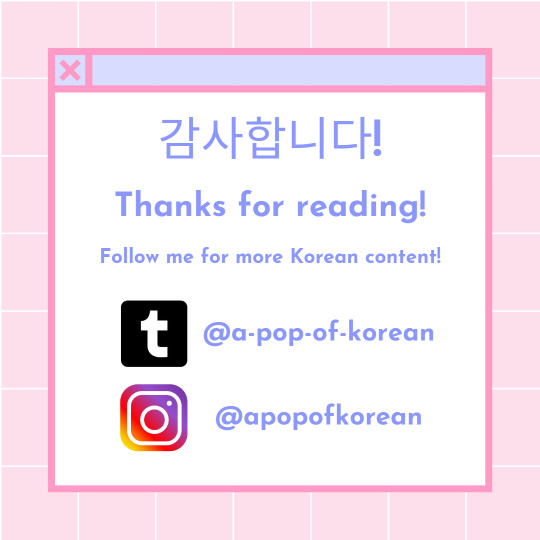
My masterlist
Join my Discord chat here to practice Korean with others!
Follow me on Instagram here for more Korean content!
Get Drops Premium using my affiliate link to expand your Korean vocab!
Check out my Ko-Fi to support this blog and my studies! Thank you for your generosity!
#korean#korean language#korean vocabulary#korean vocab#study abroad#learn korean#learning korean#study korean#studying korean#korean culture#유학#유학생활#한국#한국 문화#어휘#한국어#한국어 공부하기#한국어 배우기#langblr#korean langblr
392 notes
·
View notes